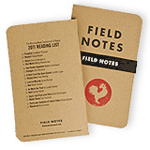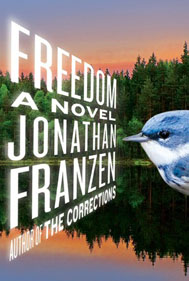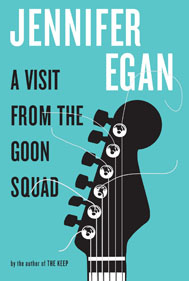-
March 28, 2011
Semifinals
-
Commentary by
Kevin Guilfoile & John Warner
-
Today’s Winner:
1Freedom
Kevin: We have to give credit to Freedom. It has probably had (in the sports parlance we normally try to avoid) the toughest schedule, and yet it has taken on all comers and survived. As we know from seven years of Roosters, it often doesn’t take much to push a person’s preference toward one book or the other. This time we have an actual rock musician judging two books that involve, to varying degrees, rock music. We didn’t plan it that way, but serendipity happens.
Considering this match up ahead of time, I was thinking that Goon Squad is more about the music industry and wondering how that might play with a judge who has real-life experience with those characters and institutions. I wondered if Judge Leithauser was going to end up like doctors I know who roll their eyes at episodes of House.
He never actually tells us if any of that weighed on his decision, but he did choose the book that is (at least marginally) more about musicians than suits. And he did admit to being turned off by one chapter in Goon Squad, “in which a struggling publicist escorts a rebounding movie star to the secret jungle headquarters of an African dictator.” I’ll admit that when I read that chapter I didn’t think it did tremendous things for the novel’s verisimilitude. Until, of course, this happened.
 Buy anything from Field Notes from now until the end of the ToB and receive a special “reading list” memo book free, while they last. Use coupon code ROOSTER.
Buy anything from Field Notes from now until the end of the ToB and receive a special “reading list” memo book free, while they last. Use coupon code ROOSTER.I think these were the two most ambitious books in the tourney (again, I haven’t yet read Skippy Dies), and perhaps my two favorite books from last year, or close to it. And I know from comments here and elsewhere that some people consider this the real finals. If pressed, I don’t know which one I would choose.
We talked on stats day last week about the length of novels, but not so much how it affects the reader. I think there is at least one simple way to look at it. If you like two books roughly equally, you might persuade yourself that you prefer the longer one. Because it seems more ambitious. Because you appreciate the time spent in that world. Goon Squad is the more original of these two books but the fictional universe created by Franzen is larger. There has to be some appreciation of that.
On the other hand, I think Goon Squad is in many ways technically superior. A big book can’t help but have more things wrong with it, and so if we’re really lining up the pros and cons here, I think Goon Squad gets the edge.
Until I convince myself that it doesn’t. Shoot.
Wait there’s another way. There’s only one of these books that I will ever reread.
Goon Squad it is.
John: Ooh! Not fair, the reread card. I have not been thinking about the books this way. Why do I now need another way to think about these books relative to each other?
I’d already twisted myself into knots peeking in on one of the ancillary ToB discussions at commenter Kerry’s website Hungry Like the Woolf, where the group there got to talking about Lionel Shriver’s So Much for That and which books in the tournament qualified as highbrow versus middlebrow. It’s not like I wasn’t previously aware of these terms—I not stupid—but I’d never bothered applying them to books in the tournament. I guess I was operating under the assumption that if a book was in the tournament then it didn’t matter, that obviously they met my own personal definition of “nondisposability.”
But then I realized that my definition probably over-privileges intent over effect. I’m sure this is because as a writer, I identify with them from that angle. I know what my aims are, even as I know I fall short. That is, I trust that the authors we’ve chosen for the tourney are aiming for writing a book that attempts to say something about the world as it is, rather than the way we may wish it to be, which is just another way of saying I think they’re aiming for work that isn’t easily dismissed.
Put another way, a romance novel is different from a love story. One of my favorite series of books is the late Robert Parker’s Spenser novels, and one of the reasons I like them so much is because I know from the moment I pick the book up that justice is always served. Spenser will crack wise, he will cross the wrong person, but through a combination of guile and muscle and usually with help from his friend Hawk (and his super-intelligent, loving, hot, sexy, steady girlfriend, Susan Silverman) Spenser will extricate himself from this trouble, saving the day for everyone. This, clearly, is not the way the world works. Injustice goes unpunished everywhere, from the recent actions of the governor of Wisconsin to the fact that Snooki is a bestselling author.
Here’s the thing. I reread those Spenser books. I also reread Elmore Leonard and Gregory MacDonald (Fletch). Does this make them better than the ostensibly “literary” books I also claim to love?
I thought we were friends. How could you do this to me?
Our TMN patron Rosecrans Baldwin did me no further favors by forwarding us this link about (former ToB judge) Dale Peck’s new publishing venture, Mischief + Mayhem, which is working entirely from a print-on-demand model, eschewing bookstores entirely. Deeper into the article it discusses several books that apparently can’t find publishers because of traumatic scenes involving the deaths of children. The message from publishers is that people don’t want to read that. It further says that Skippy Dies (my personal favorite book of the year) was rejected by every publisher in America until FSG pulled the trigger.
It’s true, people don’t want to read about the death of a child because that’s a horrible thing, except that it’s a horrible thing that really does happen. Maybe publishing, by virtue of some of these unstated dictates, is pushing books toward the middlebrow.
What if Jack perished in Room? My hunch is that the effect would be devastating on the readers, yet also possibly be emotionally true. I also bet that very few people would reread that book.
I’ve wandered off track. On your reread criteria: I actually would reread Goon Squad or at least parts of it because I think more about the construction of the book would be revealed upon further examination, where I have very little desire to reread Freedom.
And yet, if I were choosing, I’d go the opposite way from you and concur with Judge Leithauser.
Kevin: I read that article and I’m not entirely convinced that all those M+M manuscripts are unreleased because cowardly publishers won’t tackle difficult issues like children who die. Russell Banks, a genius, had no problem publishing The Sweet Hereafter, and Alice Sebold, an unknown, was able to sell a grajillion copies of The Lovely Bones. Every author with a book that goes unpublished (or a book that doesn’t sell well) has some rationalization as to why they are a victim of either cowardice or pedestrian taste. But it’s also true that publishers make mistakes all the time, passing on brilliant books (I think immediately of Home Land, a ToB finalist that was dismissed by dozens of publishers before being released as a paperback original). Maybe all that tells us is that Mischief + Mayhem doesn’t yet have a Russell Banks or an Alice Sebold in its stable.
And yet, crime novels kill children by the pallet-loads and they sell lots and lots of copies. So let’s just assume the premise is correct: that in the current publishing climate it is difficult to sell a realist literary novel in which children die, while no one gives a second thought to a crime novel in which children are tortured and murdered. Why? Is it the fact that in a typical crime novel, like in your Spensers, a child can be taken but in the end retribution is served? Order is restored.
What I’m wondering is this: If we are exploring the extremes of human behavior or the depths of human misery in a book that expects a significant commercial readership, can we really only do it in novels that avoid the world as it really is, one way or the other? In other words, must a realist literary novel necessarily avoid certain truths because those truths are so painful as to make the book seem nihilistic? And can a crime novel explore those themes, but only if it artificially restores order in the end?
John: We are deep down the well with this one, my friend. Perhaps the readers can throw us a rope and haul us out. Jodi Picoult has made a career out of putting children in jeopardy and no one says boo about it, but then, to my knowledge (I’ve only read one of her books) there is always a happy ending, a restoration of order, rather than a recognition of the chaos and disorder she throws her characters into. In that conversation at Hungry Like the Woolf, one of the chief criticisms of So Much for That is that the ending is too upbeat, and therefore (I take it) implausible in the world Shriver has created. Freedom comes in for some similar criticism. It’s like the readers of the domestic, literary, realist novel don’t believe in happy endings, even though we practically demand them from genre/commercial books.
Kevin: But neither of those novels could be described as “dark.” I guess the question we’re asking is how dark can you go (in a commercially successful novel) without giving the reader the succor of a happy ending?
We won’t arrive at that number here.
So, tomorrow we have Next versus The Particular Sadness of Lemon Cake, a White Male Fuckup Novel versus a Touchie Foodie (TM, just thought of that) novel. For all the talk about masculine versus feminine in this tourney, this might be the Bobby Riggs versus Billie Jean King of the ToB.
In other news, the defeat of Goon Squad shakes up our Zombie rankings in a way that will delight as many readers as it will anger. So let’s empty a 40 for Skippy Dies. If the Zombie Round started today (instead of the day after tomorrow) the two scabby combatants would be Room and A Visit From the Goon Squad.
Both of which were vanquished by Freedom.
Oh, dear. Call an emergency meeting of the ToB executive committee.
No, sorry. First, form a ToB executive committee. Then call a meeting of it.
Zombie pairings will be officially announced with tomorrow’s result. I’m a little giddy.
John: That’s the wine talking, folks.
Kevin Guilfoile is the author of two acclaimed novels, Cast of Shadows and The Thousand, which have been translated into more than 20 languages.
John Warner’s novel, The Funny Man, will be released late September of this year by Soho Press. For the time being, he teaches at Clemson University.

















